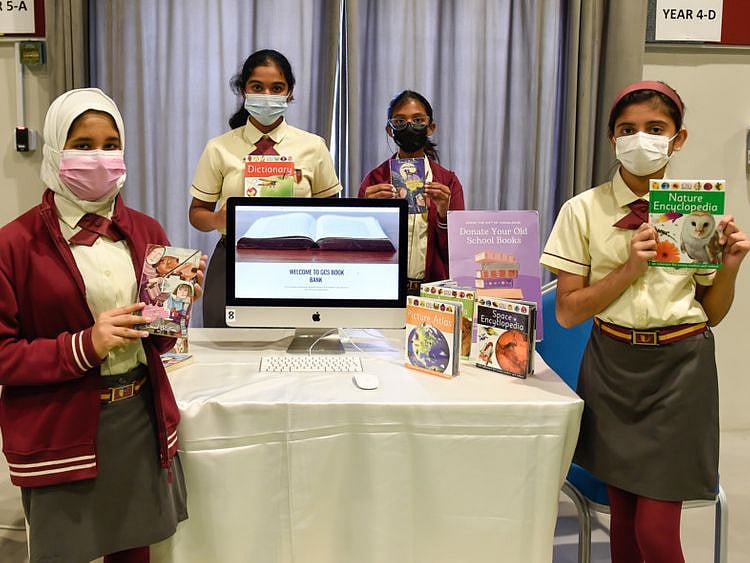GEMS Cambridge students showcase innovative projects in Sharjah
Technovation exhbition in line with sustainable development goals

Dubai: The GEMS Cambridge International Private School – Sharjah hosted its very first Innovation Exhibition – Technovation Exhibition on Monday. The theme of the exhibition was Sustainable Development Goals or Global Goals set out by the United Nations.
“There is a collection of 17 interlinked global goals designed to be a blueprint to achieve a better and more sustainable future for all. The SDGs were set up in 2015 by the United Nations and the Technovation Exhibition is about that,” explained Albie Huyser, principal of GEMS Cambridge International Private School – Sharjah.
“The students researched and came up with a solution for all the 17 goals using their innovative skills and robust thinking process. Students created presentations, 3D models and prototypes to showcase their projects. Even the logo of the Technovation Exhibition was a design marvel created by students who aligned the innovative evolution of a butterfly as it evolves through various stages, just the way students evolve in their design thinking process to make their projects a reality,” she said.
Sheillie Chaudhary, Head of Innovation & UAE National Agenda, worked with the students to help them in their creations and innovations.
“We at the Cambridge School encourage our students to think out of the box. The whole exhibition was put together within a span of two weeks and we are very proud of the students and how far they have come,” she said.
Ranju Anand, Vice-President – Schools, GEMS Education, said: “Our system is very focused on value-added education and this exhibition is an example of this.”
Some projects on display
Aquaponics
Eight-year-old student of the school, Ameya Sathees, of Grade 2 explained her ‘Aquaponics’ project. Aquaponics is a form of agriculture that combines raising fish in tanks in tandem with soilless plant culture. The nutrient-rich water produced by the fish provides a natural fertiliser for the plants, which in turn purifies the water that circulates back to the fish tank. This system mimics the dynamics of natural water bodies, but in a controlled environment, thus allowing for natural forces to perform functions that are usually fulfilled by chemical additives and labour-intensive interventions in conventional indoor agricultural systems.
“My parents and I went to an aquaponics farm one weekend in Sharjah. I loved it. The idea of having an aquarium and using fish waste as fertiliser was very interesting. I told my teacher about it and now my school is proposing to have a farm.”
The Cargo Connect – FLL
Five students of Year 12 have developed a project relating to changing the future of local cargo delivery. “What we have done is created a prototype. There will be a robot, Cymo, and an uncentralised hub in each neighborhood so that your packages will arrive in less than one hour. It has high security, so only you and the robot can access that cargo. It runs completely on a solar-charged battery, so no carbon footprint. It can navigate its way through an area with great precision while merging with pedestrian traffic. It can also communicate effectively through AI even with the people of determination,” said Year 12 student Hannah, 17.
Virtuate
Four Year 9 students have created an app called Virtuate.
Ibrahim Noman, 13, explained that the app is an augmented reality concept developed by students at GCS where one can view products and objects globally in real life and experience the physical look and feel of it.
“This concept bypasses the restriction of one brand and facilitates multi-brand viewing capacity through augmented reality app VIRTUATE,” he said.
Foot track
Year 8 students of the school have developed the ‘foot track’.
Akash Navin, 12, said: “Underneath the sole of our shoe is a little button located on the heel which measures your footsteps; when taking a step, you raise your foot and your heel goes upwards, and when the step is taken, it touches the sensor, marking a footstep which is sent to the mobile app. We also have a GPS tracker to measure how far you walked.”
GCS Book Bank
This innovative idea was conceived keeping in mind those less fortunate among us. Textbooks that are usually discarded after an academic year can now be bought for just Dh1, with the money being donated to Dubai Cares, the charity for underprivileged children in the UAE.
Savanna Khursheed, 11, a year 7 student, said: “Used textbooks can be dropped off at the GCS campus after registering on the website and dropping them off after school hours. These books can be collected by registering on our website and simply arriving at the school during the designated time. Our website will be linked to the school website, so that parents and other virtual visitors will get an opportunity to donate to this project.”
Sign up for the Daily Briefing
Get the latest news and updates straight to your inbox
Network Links
GN StoreDownload our app
© Al Nisr Publishing LLC 2026. All rights reserved.